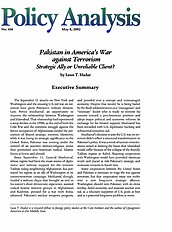The September 11 attacks on New York and Washington and the ensuing U.S.-led war on terrorism have given Pakistan’s military dictator, Gen. Pervez Musharraf, an opportunity to improve the relationship between Washington and Islamabad. That relationship had experienced a steep decline in the 1990s, as the end of both the Cold War and the common struggle against the Soviet occupation of Afghanistan eroded the perception of shared strategic interests. Moreover, while it was losing its strategic significance to the United States, Pakistan was coming under the control of an assertive military-religious nexus that promoted anti-American radical Islamic forces at home and abroad.
Since September 11, General Musharraf, whose regime had been the main source of diplomatic and military support for the terrorist Taliban ruling neighboring Afghanistan, has portrayed his regime as an ally of Washington in its counterterrorism campaign. Musharraf, though, headed a military clique that brought an end to his nation’s short democratic experience, assisted radical Islamic terrorist groups in Afghanistan and Kashmir, pressed for a war with India, advanced Pakistan’s nuclear weapons program, and presided over a corrupt and mismanaged economy. Despite that record, he is being hailed by the Bush administration as a “courageous” and “visionary” leader who is ready to reorient his country toward a pro-American position and adopt major political and economic reforms. In exchange for his belated support, Musharraf has been rewarded with U.S. diplomatic backing and substantial economic aid.
Musharraf’s decision to join the U.S. war on terrorism didn’t reflect a structural transformation in Pakistan’s policy. It was a result of tactical considerations aimed at limiting the losses that Islamabad would suffer because of the collapse of the friendly Taliban regime in Kabul. Rejecting cooperation with Washington would have provoked American wrath and placed at risk Pakistan’s strategic and economic interests in South Asia.
Some cooperation between the United States and Pakistan is necessary to wage the war against terrorism, but that cooperation must not evolve into a new long-term strategic alliance. Washington should view Pakistan, with its dictatorship, failed economy, and insecure nuclear arsenal, as a reluctant supporter of U.S. goals at best and as a potential long-term problem at worst.

This work is licensed under a Creative Commons Attribution-NonCommercial-ShareAlike 4.0 International License.
